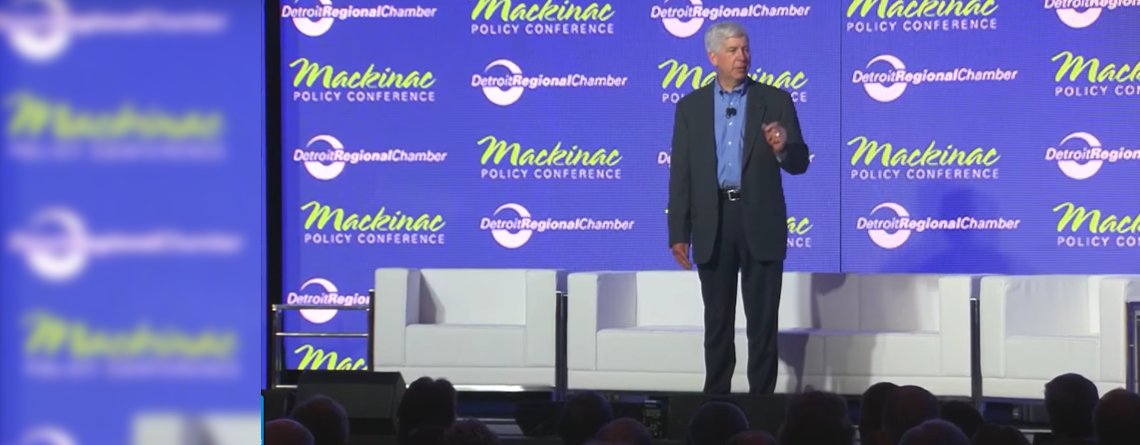
In his opening remarks at The Mackinac Policy Conference, Michigan Governor Rick Snyder called for Michiganders to shift their focus from the “depressing” past to focus on solutions. He said that lately, talking to the media was “like talking to Eeyore.”
I can relate. When it comes to Flint, it’s hard to have a positive outlook. Personally, I don’t think that we need to forget the past to move forward, and I think it’s important that we keep asking questions about what happened, how it happened and who was responsible. But I think Governor Snyder has a good point about not letting these questions bog us down, or draw our crucial energy away from working together to find solutions.
The news from Flint is overwhelming. It’s bad but how bad? What can be done to fix the situation? Who is responsible? How can we keep this from happening again? And, maybe the most stultifying question, why wasn’t something done about this sooner? We’re in the midst of the crisis, and it’s hard to know which question to try to answer first. Whether you’re a Flint resident, an aide worker, a politician, or a concerned citizen, the facts are hard to swallow, and next steps are uncertain.
We asked some of these questions in Beyond the Tap, a half-hour co-production with the WORLD Channel that aired in April. In the segment, we looked at Flint as a harbinger of crumbling infrastructure in Michigan and beyond. We encountered a number of moving stories, untangled some facts, but found ourselves in the shadow of those big questions, without any clear answers.
In the meantime, there are a few voices that have emerged from this crisis that could help us move forward with some solutions. One of those voices is Marc Edwards, a professor of civil and environmental engineering at Virginia Tech, who was instrumental in establishing that there was, indeed, a huge problem in Flint. Edwards is leading the effort to answer the “how bad?” and “how can we fix it?” questions through his team’s continued sampling of lead levels in the water. In a press conference yesterday, he gave us some markers that carry a modicum of hope with them.
Based on recommendations from lead researchers, the EPA, DEQ and the City of Flint residents should flush their pipes and they will reimburse them for running the water. The theory: flushing will remove remaining loose deposits of toxic rust from pipes, and will replace the protective coating of orthophosphate, a corrosion control chemical in the pipes. Yesterday’s good news: this approach seems to be working.
Along with water experts from Wayne State and the University of Massachusetts, Edwards presented data from a sampling of “a few sentinel homes in Flint” where researchers are seeing “very encouraging results.” After thorough flushing over the course of a month, they observed that lead levels were reduced dramatically. And another piece of good news: the water also met federal standards for levels of chloroform and disinfection byproducts. The water is safe for hand washing and bathing, but not for drinking. Yet, according to Edwards a thorough, citywide sampling is needed before they can determine if and when the water supply will meet federal safety standards. Results from that citywide sampling are expected by early August.
It’s June now, and the tragedy is still unfolding. We’re still in a state of emergency– there are still a lot of people suffering, and the questions remain, largely unanswered. But, yesterday we had evidence that when people come together, and work towards a solution, we can make progress. A step forward. Too little, too late? Maybe. There are decades of work to be done to answer those big questions, and try to heal the lives of people who have been hurt by this calamity. But, at the very least, we can say: more of this. More fact-finding organizations working together, on the ground, to get the best information they possibly can. More talking about those findings as soon as you confirm them, to as many people as possible. More consideration to connect the dots between those facts and the actions that will lessen the suffering of those that have already suffered too much. More steps forward.
Want to do something right this minute? Sandy Baruah announced the #FlintChallenge in opening remarks at Mackinac Policy Conference today: a fundraising campaign to support the “Dr.Mona Fund” for Flint kids. Learn more about the Flint Child Health & Development Fund.




